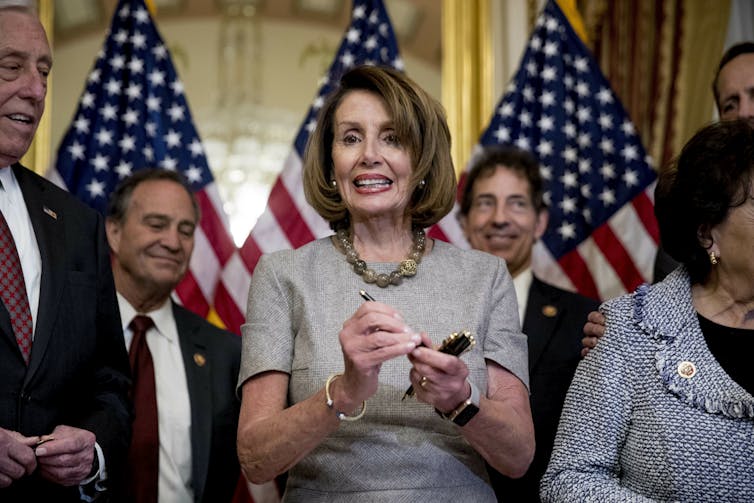from The Conversation
— this post authored by Timothy Ryan, University of North Carolina at Chapel Hill; Andrew W. Delton and Peter DeScioli, Stony Brook University (The State University of New York)
Even as the partial shutdown of the federal government came to an end, many Americans were left baffled.

Please share this article – Go to very top of page, right hand side, for social media buttons.
Why didn’t Congress and the president strike a deal sooner?
Hundreds of thousands of federal employees were asked to work without pay because of a fight over a border wall. The full economic cost of the shutdown is likely to be far larger than the amount politicians are fighting over.
From our perspective as social scientists, this shutdown is an example of the powerful forces that make political bargaining very different than bargaining over, say, the price of a new car.
We have found that one of the greatest barriers to political agreement is moral outrage. The shutdown over funding for a border wall with Mexico is but the latest example of an issue that is relatively small in monetary terms acquiring outsized influence because it became a moral sticking point.
A moral standoff at the border
It might seem obvious to blame the shutdown on partisan politics. But, partisan politics apply equally to almost any political negotiation. Why did the wall in particular become a flashpoint?
The way people usually move past a bargaining impasse is to look for more ways to sweeten the deal until everyone is happy.
For example, say you want to buy a car with a working air conditioner. I have a car with a broken air conditioner. I can’t fix that, but I can knock US$300 off the price. This kind of give-and-take is key to greasing the wheels in politics, but it breaks down when morality is in play.
What payoff you would accept to do something you think is immoral? For example, what if someone offered you $10 to wear a Nazi symbol, hunt an endangered species, or burn your country’s flag?
Most people would storm off in disgust, not ask for a better price.
House Speaker Nancy Pelosi of Calif., accompanied by House Democratic members stand after signs a deal to reopen the government on Capitol Hill in Washington. AP Photo/Andrew Harnik
Now, consider the moral accusations that accompanied the shutdown. At the outset, Democratic Speaker of the House Nancy Pelosi said:
“A wall, in my view, is an immorality.”
In his Oval Office address, President Donald Trump responded:
“The only thing that is immoral is the politicians to [sic] do nothing and continue to allow more innocent people to be so horribly victimized.”
This exchange is an example of what we call “moral thinking.” In our research, we study how moral thinking interferes with political bargaining and closes the door on compromise.
Costly stalemates
In one study from 2016, we asked participants whether they would support hypothetical politicians who cut deals on a political issue. Generally, they were willing to support politicians who bargained with each other. They recognized that, in politics, you can’t get everything you want.
But when participants had moral convictions about the political issue, they withdrew support – even for politicians from their own party. We saw similar patterns on issues with an obvious moral dimension such as same-sex marriage, and also ones where the moral implications are not as clear, such as Social Security reform.
More recently, we conducted experiments that more directly test whether people are prone to costly stalemates over political issues they think about in moral terms.
In an economic game, participants played the role of a legislator. Their job was to bargain over a series of political issues with a person who disagreed with them about those issues. For instance, one participant might want to raise the minimum wage and would therefore be paired with someone who wants to lower it.
If they reached a deal, both participants could earn real money – and more money, the more concessions the opponent agreed to.
If they could not reach a deal, then both earned nothing – analogous to a shutdown where everyone loses.
We found that when participants bargained over an issue that had little moral significance such as the cost of road tolls, 72 percent of pairs reached a bargain.
When they bargained over a morally fraught issue such as funding for stem cell research, only 60 percent of pairs struck a bargain.
This was the result of bargaining over fictional political policies. When real policies are at stake, and when both sides are working hard to portray their side as morally righteous, we suspect moral outrage poses an even greater barrier to compromise. That’s both because politicians have their own moral convictions, and because they fear repercussions from the citizens who judge them.
Many people believe moral considerations have begun to show up in debates over more political issues than they used to, but the evidence is unclear.
Either way, compromise is indispensable to many pressing issues – immigration, criminal justice reform, housing and Brexit, to name just a few. When voters and leaders alike cultivate ways to keep moral outrage in check, they will be more likely to find pragmatic solutions to these stubborn divides.
Timothy Ryan, Associate Professor, University of North Carolina at Chapel Hill; Andrew W. Delton, Assistant Professor of Political Science and Management, Stony Brook University (The State University of New York), and Peter DeScioli, Assistant Professor of Political Science, Stony Brook University (The State University of New York)
This article is republished from The Conversation under a Creative Commons license. Read the original article.








